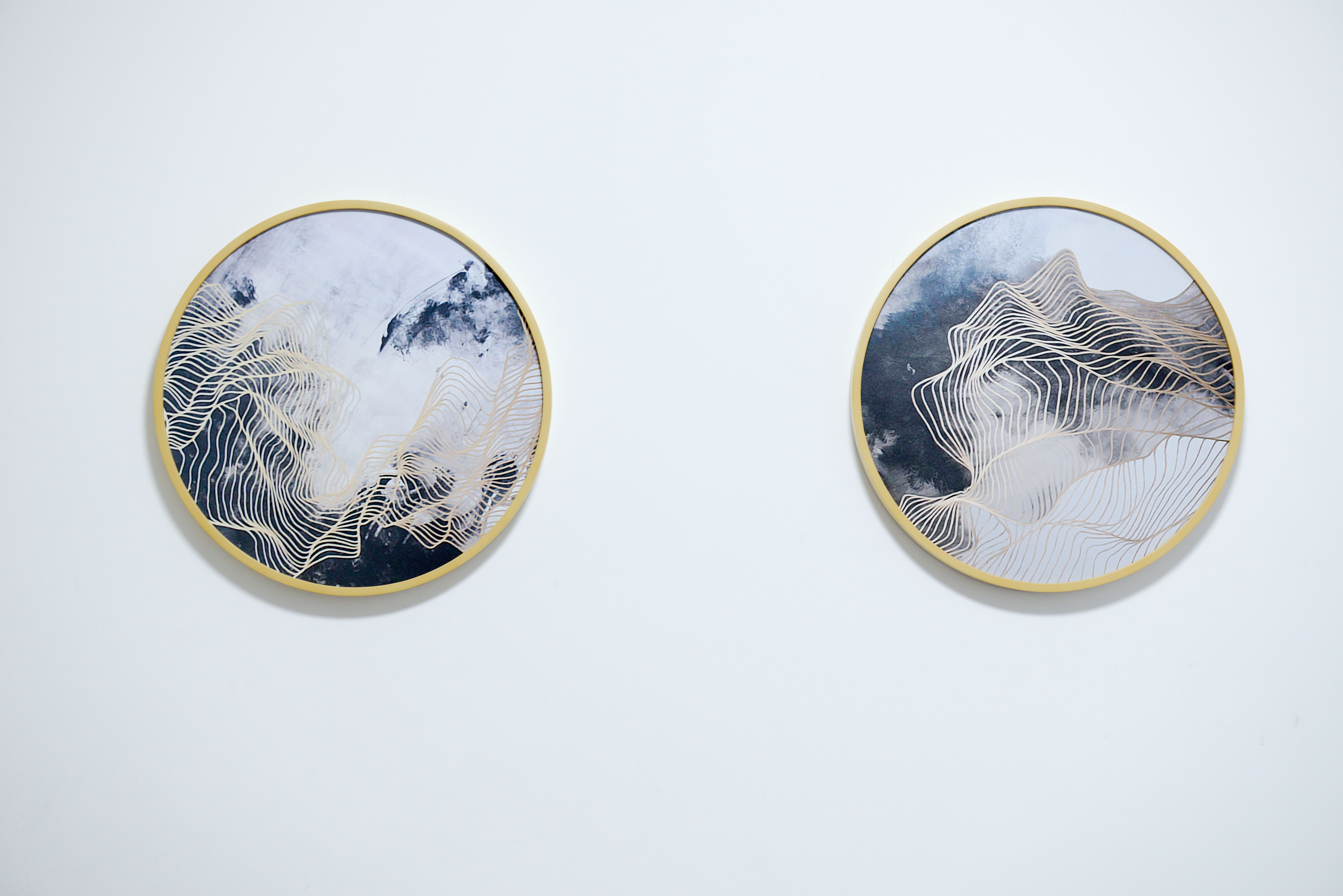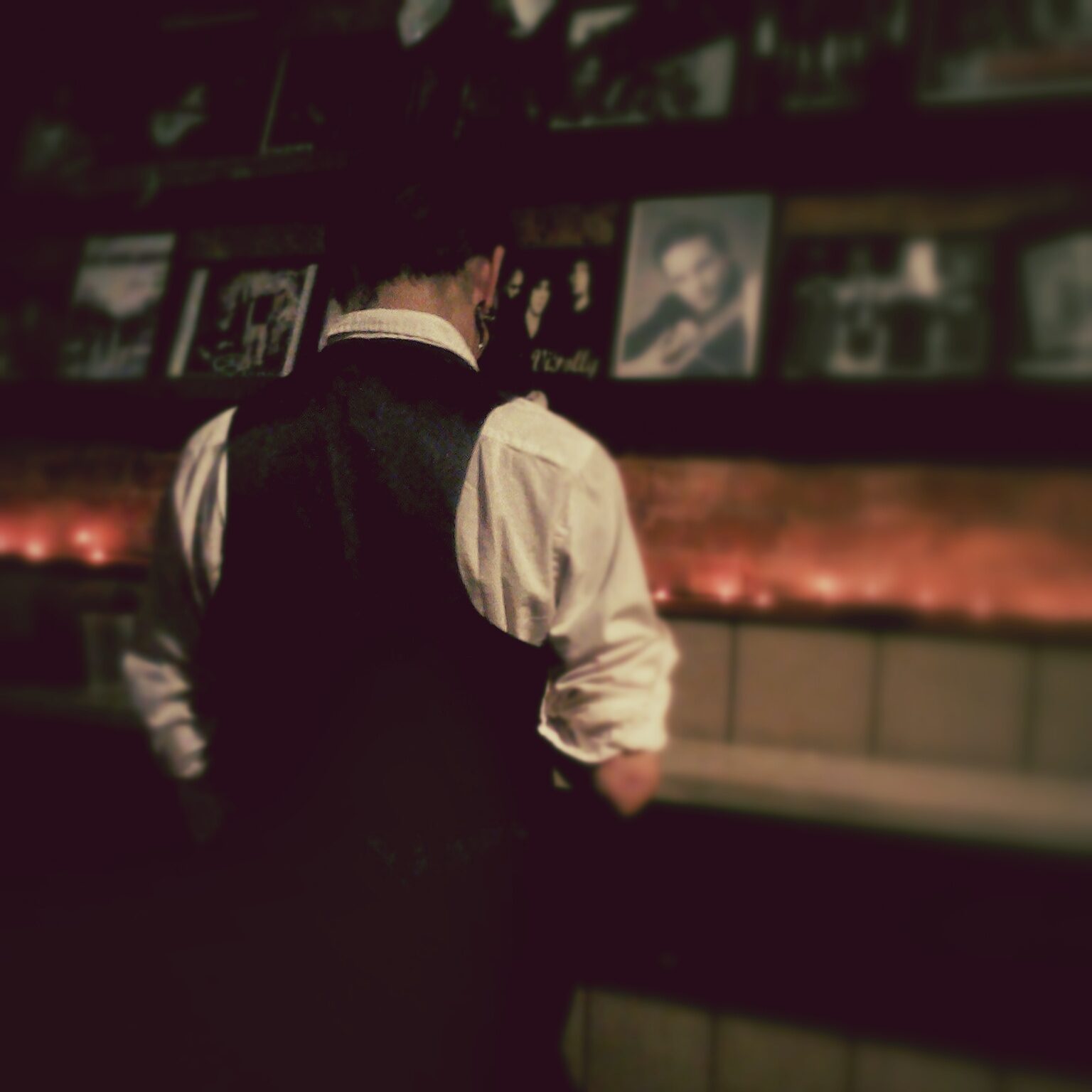The vast ocean stretched before Aaliyah.. What lay beyond the huge mass of water? She dug her toes deeper into the wet sand. A gentle wave washed over her legs, carrying the sand back into the water. Aaliyah’s hand in front of her eyes provided little protection against the sun. She lay back, little hot grains of sand against her back, a brief sting that passed as quickly as it came. Closing her eyes worked better than shielding the sun with her hands. Through her eyelids, the sun shone red. She was sure her nose would be sunburnt later. But she was willing to take another sunburn in exchange for a day on the beach. How beautiful it was, the ocean and its tune: the whispering waves, the crying gulls, the laughing children. From afar, a ship’s horn joined in the song. The sea and Aaliyah. Aaliyah and the sea. How long has she been here now? The horn grew louder. Aaliyah sighed. It wailed again. Louder. Faster.
“Yeah, yeah,” Aaliyah said, annoyed. “End Memory!”
The glaring neon lights and the hard chair she found herself sitting in now had very little in common with the cosiness of the beach. Her toes felt squished inside her work shoes.
The horn still lamented.
Sighing again, she opened her eyes and turned off the telespector’s alarm clock.
The horn fell silent.
As did the Memory’s murmur. Aaliyah took her access card out of the machine and placed the forehead pod back into its charger. Had the chair been placed like that before she entered? Probably. Nobody would notice anyway if it hadn’t. She went to the apartment’s entrance and opened the door carefully. Nobody there. Quickly, she slipped out into the hallway and closed the door behind her. On the door, colourful letters shone in her direction: Pilgrim.
Nameplates were one of the few ways occupants could personalize on Kivotos-4. Aaliyah tiptoed along the hallway, back to the infirmary. No one needed to know where she spent her time. Also, the unnatural sound her steps made on the metallic floor gave her the creeps.
Not everyone had a problem with the reverberation of metallic floors. For instance, the woman who came toward her from the opposite direction didn’t seem to care. Aaliyah knew straight away who it was. Only one person walked that loudly. One hundred and twenty-five years old, yet still fit, Aaliyah thought. The old woman smiled when she came into view.
“I missed you, honey,” she said. “Where have you been?”
“Afternoon break,” Aaliyah replied. “Are you feeling better?”
“Oh, there’s always something when you are old,” her patient said. “Sometimes, I’d like to be as young as you again.”
Little does she know, Aaliyah thought, what it is like to spend a whole lifetime on Kivotos-4 .
“I have to go back to work,” Aaliyah said, quietly.
The old lady moved on loudly–clonk clonk clonk–and opened the door with the colourful letters. The click of it shutting echoed past Aaliyah as she continued toward her destination. Why did she have to go back to work now? That word–afternoon–followed her as she walked past Kivotos-4’s massive windows, feeling small. There was no such thing as afternoon here; it was always nighttime. Every day it became murkier. Every day Kivotos-4 moved further from the sun. When Aaliyah was a child, planet Earth could be seen with the naked eye. But now, it was too far away.
Kivotos-4 was one of eight space stations, or arks as some people tenderly called them, carrying twenty thousand people through space. Eight stations floating in eight different directions, and nobody knew if they would ever reach a habitable planet again. The scientists of the original Kivotos program had planned to send forty-eight ships into space to find a new planet for humankind, but simultaneous eruptions of the Tongavo and Cerro Quacho volcanos terminated the research prematurely. The following volcanic winter made Earth cool down too quickly and humans die slowly.
Out of nearly nine billion people, only one hundred and sixty thousand survived, now adrift through the vastness of space.
Theoretically, Aaliyah lacked for nothing here. That was what she believed, at least, until she discovered how to access other peoples’ Memory: the extremely creatively named machine in which people could store their memories and virtually experience them again and again.
Memory wasn’t a simple machine like a television. It could reproduce all the feelings, all the smells, and all the sounds of a memory. Working in the infirmary, Aaliyah had access to any patient’s Memory. By doing that, she could feel what only a handful of people on the Kivotos had ever felt. Something that nobody of her age had ever experienced and probably never would: life outside a space station. Life on planet Earth, the place of her family’s origin, the place of her species’ origin. A place that would forever be secret for her.
Ms. Pilgrim’s beach holiday in Spain was one of her fondest memories.
Aaliyah could already sense her colleague’s mood when she entered through the automated doors of the infirmary. It wasn’t the best mood.
“You’re ten minutes late, again. I’d like to take a break too, you know.” Her disgruntled colleague rose from her seat and passed a clipboard to Aaliyah. Aaliyah sat down behind the counter and put the clipboard on the table. How strange that was, the clipboard. In a world fully digitalized, they still used that old thing. Maybe there was nothing left to develop further with a clipboard: a tool of perfection.
Aaliyah’s colleague turned around at the door.
“By the way, Ms. Petersson wants another appointment, again.” Then she left.
That was the best thing that could have happened to Aaliyah. Ms. Petersson was a frequent guest at the infirmary, one of those people who always felt sickly. That was why Aaliyah already knew a lot of her memories, and now she would have the chance to continue the holiday in Italy.
Aaliyah called the old woman sitting on the other side of the room.
“Ms. Petersson?”
Nothing happened. She might have fallen asleep.
Aaliyah got up and kneeled beside the old woman. She was snoring quietly. Yes, properly asleep. She had very few wrinkles for being one hundred and sixty years old. Aaliyah thought she could easily do twenty more years,.
“Ms. Petersson,” she said and took the old woman’s hands in hers. In contrast to her face, the hands did fit a one-hundred sixty-year-old. Hard, leathery and full of deep trenches. Not the hand that used to run through Ricardo’s hair in Italy. Aaliyah woke the old lady with a gentle shake.
“What?” she replied, sleepily.
“Ms. Petersson, it’s me, Aaliyah. You wanted to make an appointment?”
After a short period of disorientation, Ms Peterson remembered where she was and why she was there. Aaliyah helped her to get up and guided her to the counter.
“When would you like your appointment?” Aaliyah asked.
“Oh, everything hurts again. As soon as possible.”
As soon as possible back into Ms. Petersson’s Memory, that was perfect.
“How about tomorrow at 4 s.t.?” Aaliyah asked.
Ms. Petersson thought about that. She calculated. Most people who grew up on Earth never got used to the new time system.
“2 p.m.”, Aaliyah translated.
“Yes, 2 p.m. is acceptable”, Ms. Petersson agreed “but please don’t make me wait that long again. I’m not that young.”
“Of course not,” Aaliyah smiled. She watched Ms. Petersson as she left the infirmary, until she was completely out of sight.
The following night, Aaliyah didn’t sleep much. But she dreamt. Dreams of beaches and oceans and singing waves. Though her deepest dreams didn’t feel as realistic as the scenes Memory provided for her.
Where was she? Usually, Ms Peterson was in such a hurry to get to the infirmary. Aaliyah checked the time on her telespector. Almost afternoon. There it was again, that word that had lost its meaning. The artificial light on Kivotos-4 didn’t distinguish between day and night. It shone continuously, unnaturally, on and on. Most young people didn’t care. They were born here and didn’t know better. People who had seen the light of the sun had felt how it burned on their noses, so for them the unnatural light was unbearable.
A few meters away, Ms. Petersson’s door slammed shut. About time. Aaliyah waited until the click-clack towards the infirmary grew faint. Then, she sneaked to Ms. Petersson’s apartment. Her heart was beating fast as she fumbled with the door. Nobody was coming, she would have heard. Sneaking into someone else’s apartment so frequently had developed a second sense in Aaliyah, but she was still always nervous. With a copy of the senior physician’s access card, she could enter any patient’s apartment easily. It was much simpler than sliding a plastic card between the door and door frame, or reprogramming service droids who weren’t that great at keeping secrets.
There was no smell in Ms. Petersson’s apartment, just like everywhere else on Kivotos-4. Thanks to the air filtration system, viruses and bacteria couldn’t survive here, but every smell of individuality died with it. Ms. Petersson would be in the infirmary for at least one hour, and she’d have to wait to be seen today too, so maybe a bit longer still. Not to mention her pain usually grew stronger when the doctor told her, yet again, that she was absolutely fine. Aaliyah estimated about ninety minutes in total. She set her telespector alarm to 5:20 s.t. A bit longer than her allowed break time, but so what? She usually came up with a good excuse. Besides, nobody could be angry at her for long.
Almost automatically, Aaliyah’s steps guided her through Ms. Petersson’s entrance room, living room, and into her bedroom where Memory was sitting on a table. Behind the table, the window, the endless darkness, far, far away, a desolate Earth was floating.
Aaliyah turned on Memory and put the access card with Ms. Petersson’s data in it. Memory’s reply appeared on the display immediately:
Hello, Doreen. Nice to have you back. Where would you like to go today?
Where would she like to go? There were so many possibilities. Most memories she already knew. Maybe 17 June 2059, Berlin? The song of the metropolis. Crowds of people
having a hundred conversations, honking cars, droning engines. A foreign polyphony.
Or 27 December 2073, Undredal? Crunching steps in the snow, crackling wood in the fireplace. The white mountains of Norway covered with snow. Snow always reminded Aaliyah of sand, just a little bit colder.
Today, she already knew where she wanted to go. 12 August 2070, Torri del Benaco. She navigated Memory to the desired date, put on the forehead pod, and closed her eyes.
“Memory start!”
Nocturnal residual heat rested tenderly on Aaliyah’s arms. A soft breeze made her skirt dance around her ankles. Scents of freshly brewed espresso and dry red wine climbed into her nose and mingled there. Not too far away, a cricket praised the upcoming night in its vespertine song. Aaliyah’s breath scared away espresso and wine. Her heart skipped a beat when she felt his presence beside her.
“Everything alright, Doreen?”
Her hands looked so young, so small on his.
“Yes, now it is,” she replied and squeezed his hand a little firmer.
Beside them, Lake Garda mirrored the beautiful, starry blanket of the sky. They were the last guests in the café. The waiter’s cigarette smoke hovered past them toward the lake, lost in a swarm of moths and flies below a lantern.
“I wish I could sit here with you until the end of time,” said Aaliyah in Doreen’s voice.
“Nothing is forever, you know that.”
“This moment is,” Aaliyah said, and both returned to their pleasant silence.
A lone fishing boat floated in the distance. Aaliyah wondered if they had caught anything yet.
“How about going to a fish restaurant tomorrow?” she asked. “I heard it’s quite good here.”
He didn’t reply.
“Don’t you like it?”
She squeezed his hand more firmly but could only feel her own. Was he still here? One moment, he was sitting right beside her; the next, he was gone, as if he ceased to exist. The same happened to the cricket. Its song had vanished. There was no smell at all anymore. No espresso, no wine, no cigarette smoke.
“What’s happening?” Aaliyah stood up. The table in front of her began to fade. The horizon of Lake Garda grew brighter. That couldn’t be sunrise; it was far too early.
But it wasn’t the sun that rose at the horizon. It was Nothing. Nothing devoured the nightly sky and all its stars, the fishing boat, the lake, and the street beside Aaliyah.
“End Memory!” she said.
Nothing happened.
She repeated the command. Behind her, the café was also gone, and the whole world around her slowly plunged into a deep, serene Nothing. Then, Aaliyah disappeared.
The digital news ticker on Kivotos-4 had displayed the following message a few minutes earlier: We mourn the loss of Ms. Doreen Petersson. At 160 years old, Ms. Petersson was one of the last pioneers of Kivotos-4. She passed away on the ninth day of the second cycle at 4:39 s.t.
Felix Anker, born and raised and based in Germany, is a linguist working on the languages of the Caucasus. While most of his publications are scientific, he also writes about things that are not entirely true. Humour, Science-Fiction, and other weird stuff in German and English magazines (State of Matter, Don’t Submit!, A Thin Slice of Anxiety, Johnny, Veilchen, UND).
Translated from and originally published in the German.




